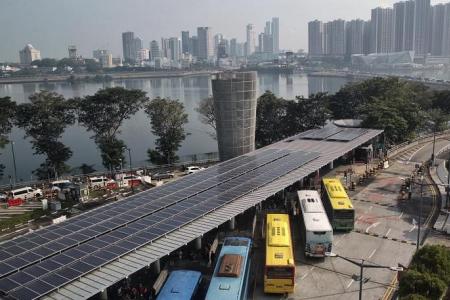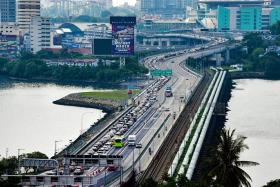To keep undesirable travellers away from S’pore, ICA could ask for advance bus passenger information
Bus operators entering Singapore via land checkpoints could be required to submit passenger information in advance to the Immigration and Checkpoints Authority (ICA).
This advance screening is to weed out undesirable travellers, like those who pose a safety or security threat to Singapore, before they reach the Woodlands and Tuas checkpoints.
Currently, airline, ship and train operators must submit advance passenger and crew information.
The plan to require bus operators to also provide such details in advance is part of the proposed changes to the Immigration Act.
The Immigration (Amendment) Bill was introduced for first reading in Parliament by Second Minister for Home Affairs Josephine Teo.
If passed, ICA would also be able to issue no-boarding directives (NBDs) to operators to prevent undesirable individuals from boarding their modes of transportation.
Such travellers include those who pose a threat to Singapore’s safety and security, said the Ministry of Home Affairs (MHA) on Wednesday.
Said MHA: “This prevents them from travelling to Singapore in the first place, instead of only being turned back at our checkpoints on arrival.”
Transport operators who fail to comply with an NBD can be fined up to $10,000.
If a person intentionally or knowingly causes the non-compliance of an NBD, he could face the same maximum fine and/or up to six months’ jail.
Transport operators who fail to submit advance passenger or crew information could also be fined.
The proposed amendments could also enhance ICA’s ability to manage situations such as pandemics.
For example, all travellers entering Singapore by land, air or sea will be required to provide their particulars upon arrival when the need arises, such as in a pandemic or crisis.
Currently, travellers only need to do so if they have applied for a pass, like a dependent or visit pass.
During the Covid-19 pandemic, ICA had to rely on the Ministry of Health’s Infectious Diseases Act to require travellers to submit health declarations.
Foreigners can be prevented from entering or transiting through Singapore on public health grounds.
Under existing laws, the Minister for Home Affairs can only prohibit the entry of foreigners on various grounds including security reasons, but it is not explicit that such powers can be applied in a pandemic.
A prohibition on public health grounds would not affect PR statuses and the validity of passes.
Singapore residents and visitors leaving the Republic can already look forward to clearing checkpoints without using passports from 2024.
At Changi Airport, there are plans to use biometrics, such as facial and iris scans, in place of physical passports and travel documents for departing travellers.

The passenger’s digital identity and flight information will be processed to produce a unique token.
From bag-drop, to immigration and boarding, this information will be retrieved using the passenger’s biometrics.
Residents, including citizens, permanent residents and long-term pass holders, would be able to clear checkpoints without presenting their passports from arrival to departure.
Foreign visitors would still have to present their physical passport on arrival, but can leave Singapore without using it.
To facilitate this plan, the Bill will empower the Minister for Home Affairs to authorise the disclosure of passenger and crew data to the airport operator for specific uses.
Said MHA: “This data will be retained for a short time and purged thereafter, and with appropriate safeguards in place to ensure data security.”
The Bill will also allow digital versions of permits and passes to be used to verify immigration status. Previously, only physical copies could be used.
Such features are part of ICA’s new clearance concept, which was introduced in 2019 to provide faster and more secure immigration and Customs clearance.
From 2024, instead of using passports, car travellers at land checkpoints will be able to generate a QR code via the MyICA mobile app.

They can scan the QR code at the immigration counter for ICA to retrieve the profiles of travellers in the car. ICA officers will then conduct facial checks and assess if they can enter.
First-time foreign visitors must still present their passports.
Get The New Paper on your phone with the free TNP app. Download from the Apple App Store or Google Play Store now


